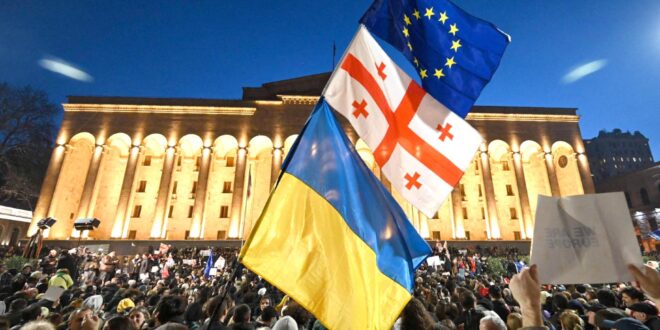In the face of mass protests, the Georgian authorities withdrew from the law in the Russian fashion. What about the aspirations of citizens who overwhelmingly want their country to join the European Union?
Will Georgia share the fate of Ukraine? This question accompanies foreign media, which closely follow the civil protests against the latest idea of Georgian Dream. The ruling party tried to introduce regulations on so-called foreign agents, aimed at institutions, especially non-governmental organizations and the media, co-financed from foreign sources. A level of support greater than 20% would mean the need for an agent’s coming out. Failure to register properly would result in a heavy fine. At the same time, the status of an agent would be a way to stigmatize, because its overtone is unambiguously pejorative. He is closer not to an insurance agent, but more to an “enemy of the people”, which brings the worst associations with spies and collaborators serving foreign forces.
Georgian Dream à la the Kremlin
Already the first reading of the bill aroused violent protests. One hundred and several dozen people were detained, the police used water cannons, tear gas and stun grenades. They manifested under state flags, European Union and NATO signs that have been present in the public space for years, and under the slogan of disagreement with ‘Russian law’. Putin’s Russia introduced similar measures in 2012 and used them to crack down on dissidents, critics of the Kremlin and independent institutions. Georgian Dream rejected this comparison, preferring to refer to American regulations, despite the fact that people and institutions disseminating the message on behalf of a foreign principal are considered agents there.
The ruling party, under the influence of the demonstrations, unconditionally withdrew the project and issued a bitter statement: the “lie machine” was responsible for causing controversy in society, which presented the matter in a bad light and misled citizens. The label of Russian law is false, nor does it mean a departure from the European course. Georgian Dream declares that it continues to direct the country towards Europe.
However, citizens have doubts. No wonder, support for EU membership oscillates around 80 percent. Nor was it about an ordinary law, but about something that could break bridges leading to the EU. Its representatives admonished the ruling party that the regulations do not meet European standards of democracy and the defence of human rights. There were also voices from the American government that the law was written on the basis of Russian and Hungarian models.
Georgia: precarious status as an EU candidate
This is not the first time that Georgian Dream has distanced itself from the West. Each such move coincides with observations about the pro-Russian authoritarianism of the formation and pulling into the Russian sphere of influence. Still in 2021. Georgia was considered a pioneer among the former USSR countries aspiring to join the Union. A year later, unlike Ukraine and Moldova, she did not receive EU candidate status. The European Commission presented a long list of necessary reforms, including a condition for the de-oligarchisation of the country. The key role here is Bidzina Ivanishvili, the founder and patron of Dream and the gray political eminence. It is he who is supposed to pull the country towards Russia, where he earned his big money.
This year, the candidate’s status would be reconsidered. A number of anti-Western measures from recent months will speak against us. The former president, the seriously ill Mikheil Saakashvili, was imprisoned. The former Minister of Justice, who at the time of sentencing was the head of the main opposition television, was convicted of abuse of power. Representatives of the parties of power are treating Europe with waning favour. It was counted that the official chairman of Georgian Dream, Irakli Kobakhidze, made nine comments criticizing Russia between February and July last year, when the fate of his candidate status was in the balance. During this time, he spoke negatively about the West 57 times and about Ukraine 26 times.
Russia is vigilant
Georgia has not joined Western sanctions against Russia for its invasion of Ukraine. It is clear that whoever governs in Tbilisi must take into account the Russian factor and act in such a way as not to give Russia an excuse to repeat the 2008 war. That several-day intervention was aimed at Georgia’s attempts to join NATO. It has effectively interrupted them and it is unlikely that membership in the Alliance will take place in the face of the occupation of 20 per cent of Georgian territory by para-state entities controlled by Russia. The country is strategically located, so it awakens Russian vigilance. It may also fear a repetition of the Ukrainian scenario. All the more so because here much smaller forces would be needed for an effective attack. Today’s demonstrations are compared to Maidan, then Russia’s reaction was to capture Crimea and part of the Donbass.
The opposition won a tactical, pro-democracy victory. However, Georgian Dream announces that it will wait until the emotions subside. Then it will return to the matter, there will also be wide consultations, the government will explain its motivations to citizens. And he will probably try to push through the lost regulations again, he will also be better prepared for a possible social counter. Probably to weaken political rivals before the next parliamentary elections. He has a lot of time, because the vote is scheduled for autumn next year.
 Eurasia Press & News
Eurasia Press & News


